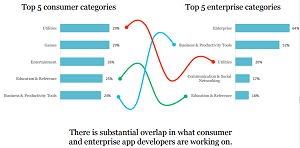News
Report Offers Tips to Avoid Mobile App 'Poverty Trap'
- By David Ramel
- July 14, 2015
A new report offers some tips for coders to thrive in a conflicted mobile app development industry.
On one hand, states the Developer Megatrends H1 2015 survey from VisionMobile Ltd., developers are the "kingmakers of modern business." On the other, some 60 percent of app store developers fall below the "app poverty line" in generating revenue.
On another hand, study after study points to a mobile skills gap holding back mobile initiatives. However, VisionMobile says some 800,000 developers -- equal to the total population of South Dakota -- are flooding the market each year.
To obtain some stability in this contradictory environment and generate sufficient revenue, the market analysis firm provided some advice for mobile developers along with its market stats.
Two obvious approaches logically follow the aforementioned findings. First, developers should move away from app stores for income and concentrate on e-commerce. Second, they should also move away from the consumer market and concentrate on the enterprise.
 [Click on image for larger view.]
Making the Jump to Enterprise Might Be Easier Than It Seems (source: VisionMobile Ltd.)
[Click on image for larger view.]
Making the Jump to Enterprise Might Be Easier Than It Seems (source: VisionMobile Ltd.)
From the enterprise point of view, VisionMobile said companies should recognize that "developers are a driving force in every industry and a source of competitive advantage." Every single company, VisionMobile said, "should master developer ecosystem skills."
That ecosystem, the company said, comprises platform technology -- such as the cloud, APIs, apps, devices, OSes and so on -- along with users and developers and rules for interaction, such as app curation and governance.
Obviously, enterprises need mobile developers, the firm maintains, and to make money, developers need the enterprise -- or, more specifically, enterprise-oriented e-commerce.
"The truth is that the app store alone cannot sustain the mobile developer population," VisionMobile exec Stijn Schuermans said in a blog post earlier this month. "[More than] 60 percent of developers are under the app poverty line and only one in nine is in the safe zone. Most money in the app economy is not made from the app store, but from app-driven e-commerce. Selling offline goods and services via apps represents 71 percent of the app economy in 2015 -- and it's earned by only 9 percent of developers! Whether using apps as a channel (like Amazon), building a mobile-first business (like Uber) or using apps as a platform (like WeChat), e-commerce is the winning app revenue model and will remain so for the foreseeable future."
Developers also need to target the enterprise app market rather than the consumer market.
"There is another way to dodge the poverty trap: target enterprises. Only 20 percent of mobile developers target enterprises, but 46 percent of them make over $10,000 per month, versus 19 percent for consumer-oriented developers. Making the jump to enterprise might be easier than it seems. There is substantial overlap in what consumer and enterprise app developers are working on. Many apps can be simply repositioned or repurposed to attract an enterprise audience rather than consumers."
VisionMobile also pointed to the burgeoning Internet of Things (IoT) and data-centric initiatives in general as important areas upon to which to concentrate their efforts.
"Value in tomorrow's apps will come from making sense of data," the company said. "Data developers and data platforms will be king."
VisionMobile harkened back to its consumer-to-enterprise shift in explaining how data devs can prosper. "We see a similar pattern among IoT developers," the company said. "Winning app and IoT developers will repurpose consumer technology and business models to solve the most important enterprise problems, and dodge the poverty trap by doing so."
Finally, the market analysis firm pointed to two additional means of escaping the poverty trap. First, it said, the emphasis should move from standalone apps that provide value wholly by themselves to "companion" apps, where, for example, the value is in an IoT device. Successful apps will process triggers and signals across these devices -- including sensors -- and APIs. "As a consequence, data developers and data platforms will soon be king," the company said.
Along that same tack, the final escape from the poverty trap comes from the movement to data-centric apps that de-emphasize the mobile OS. This will beckon a new mobile future.
"Mobile ecosystems like Android and iOS move to the IoT in force, fully leveraging their developer and user bases to gain traction fast across all major IoT verticals," the company predicted.
"In the future, IoT device selection by consumers and enterprises will be determined by 'Will it work with my existing services and devices?'"
About the Author
David Ramel is an editor and writer at Converge 360.